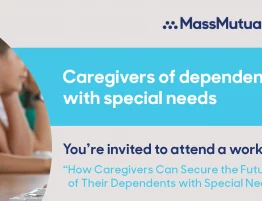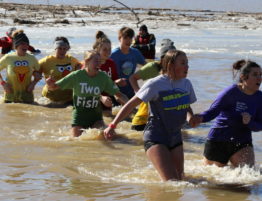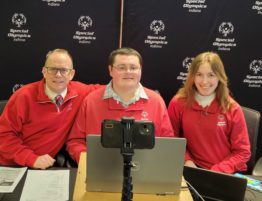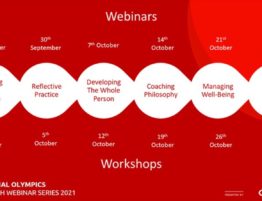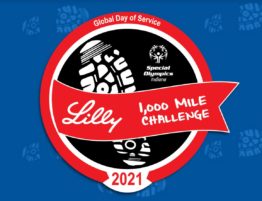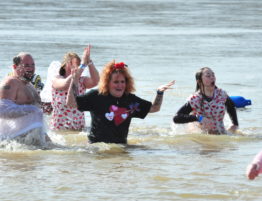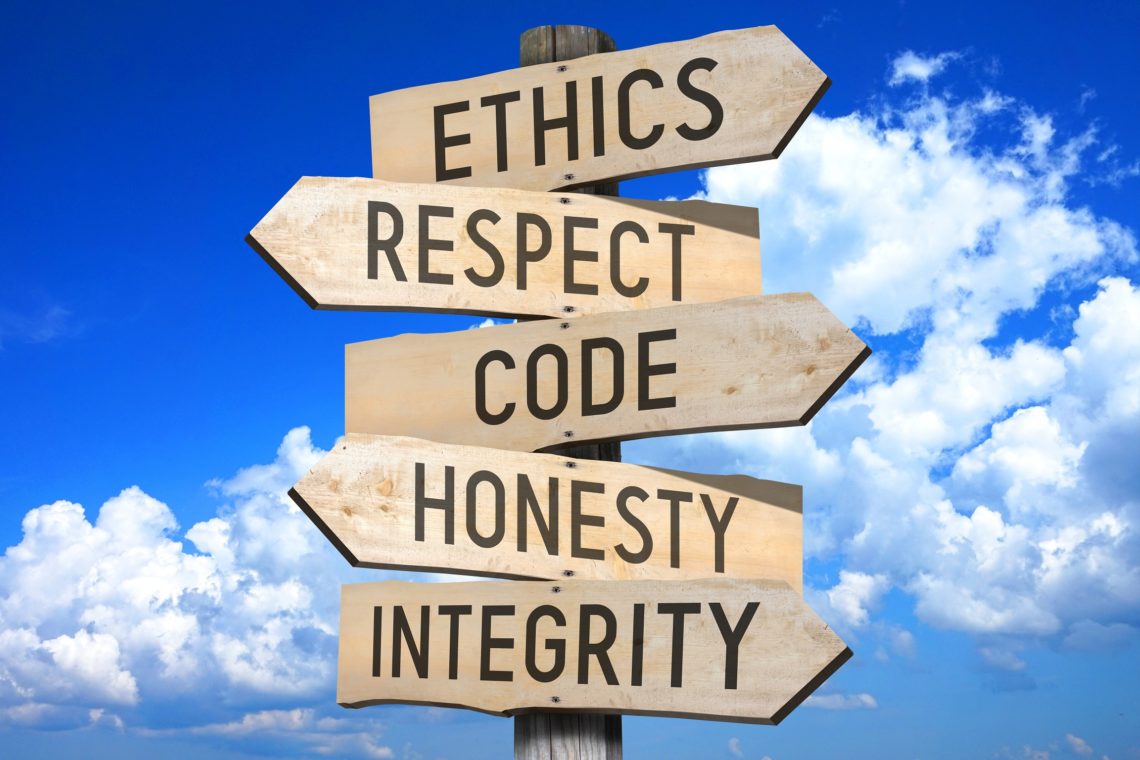
The updated version of the Code of Conduct was a recommendation from the Indiana Athlete Leadership Council and approved by the SOIN Board of Directors in January of 2022. The current Code of Conduct is for Athletes, Unified partners, volunteers, and coaches only. Revisions are in RED below.
GENERAL STATEMENT
Special Olympics is an athlete-centered movement that welcomes athletes with intellectual disabilities of all abilities as they are. The SOIN Code of Conduct was written to establish a system that encourages all participants to adhere to the Special Olympics philosophy, operating policies, and rules.
Special Olympics participants (defined as athletes, coaches, volunteers, families, and spectators) will:
1. Conduct themselves in a sportsmanlike manner at all times, refraining from being offensive by action or language toward athletes, coaches, volunteers, opponents, officials, and/or spectators,
2. Place the health and safety of Special Olympics athletes above all else,
3. Abide by the letter and the spirit of applicable rules and policies,
4. Not be under the influence of alcohol or illegal drugs while directly involved in any Special Olympics activity, and
5. Refrain from smoking in competition or athlete training venues.
6. Refrain from inappropriate contact or relationships with Special Olympics participants.
7. Appreciate the full and active participation of talented individuals with diverse characteristics such as race, ethnicity, religion, age, gender identity, sexual orientation, type of disability, and marital status, as well as differences in personality, talents, experiences, education, and cultural and socio-economic background.
8. When a participant signs the Code of Conduct, they accept that violations of the Code will be subject to a range of consequences, up to and including being prohibited from participation in Special Olympics.
Athletes and Unified Partners Code of Conduct
A. SPORTSMANSHIP
1. I will practice good sportsmanship.
2. I will act in ways that bring respect to me, my coaches, my team, and Special Olympics.
3. I will not use inappropriate or offensive language, including swearing or insulting other individuals, in any form of communication.
4. I will not fight with other athletes, coaches, volunteers, or staff.
5. I will appreciate the full and active participation of talented individuals with diverse characteristics such as race, ethnicity, religion, age, gender identity, sexual orientation, type of disability, and marital status, as well as differences in personality, talents, experiences, education, and cultural and socio-economic background.
B. TRAINING AND COMPETITION
1. I will train regularly.
2. I will learn and follow the rules of my sport.
3. I will listen to my coaches and the officials and ask questions when I do not understand.
4. I will always try my best during training, divisioning, and competitions.
5. I will not “hold back” in preliminary competition just to get into an easier final competition division.
C. RESPONSBILITY FOR MY ACTIONS
1. I will not make inappropriate or unwanted physical, verbal, or sexual advances on others.
2. I will tell Special Olympics leaders immediately if I experience behavior or abuse from another team member or volunteer.
3. I understand all telephone and electronic communications between me and any other member of Special Olympics must be appropriate and respectful, including texting and social media.
4. I understand that any social media connections I make with delegation members on my personal social media accounts are my choice and I am completely responsible for all such communications and who I choose to friend/follow on social media.
5. I will not smoke in non-smoking areas, drink alcohol, or use illegal drugs at Special Olympics events.
6. I will not take drugs for the purpose of improving my performance.
7. I will obey all laws and Special Olympics and National Federation/Governing Body rules for my sport(s).
Coaches and Volunteers Code of Conduct (including Parents who coach)
A. RESPECT FOR OTHERS
1. I will respect the rights, dignity, and worth of athletes, coaches, other volunteers, friends, and spectators in Special Olympics.
2. I will appreciate the full and active participation of talented individuals with diverse characteristics such as race, ethnicity, religion, age, gender identity, sexual orientation, type of disability, and marital status, as well as differences in personality, talents, experiences, education, and cultural and socio-economic background.
3. I will be a positive role model for the athletes I coach.
B. ENSURE A POSITIVE EXPERIENCE
1. I will ensure that for each athlete I coach, the time spent with Special Olympics is positive.
2. I will respect the talent, developmental stage, and goals of each athlete.
3. I will ensure each athlete competes in events that challenge that athlete’s potential and are appropriate to that athlete’s ability.
4. I will be fair, considerate, and honest with athletes, using simple, clear language.
5. I will ensure that accurate scores are provided for entry of an athlete into any event.
6. I will instruct each at hlete to perform to the best of the athlete’s ability at all competitions (including preliminary events) in accordance with the Official Special Olympics Sports Rules.
C. ACT PROFESSIONALLY AND TAKE RESPONSIBILITY FOR MY ACTION
1. My language, manner, preparation, appearance, and presentation will demonstrate high standards.
2. I will display control, respect, dignity, and professionalism to all involved in the sport (athletes, coaches, opponents, officials, administrators, parents, spectators, media, etc.), and encourage athletes to demonstrate the same qualities.
3. I understand all telephone and electronic communications between me and any other member of Special Olympics must be appropriate and respectful, including texting and social media.
4. I understand that any social media connections I make with delegation members on my personal social media accounts are my choice and I am completely responsible for all such communications and who I choose to friend/follow on social media.
5. I will not drink alcohol, smoke, or take illegal drugs while representing Special Olympics at training or during competition.
6. I will refrain from any form of personal abuse towards athletes and others, including verbal, physical, and emotional abuse.
7. I will be alert to any form of abuse from other sources directed toward athletes in my care.
D. QUALITY SERVICE TO ATHLETES
1. I will seek continual improvement through evaluation and ongoing coach education.
2. I will be knowledgeable about the Sports Rules and skills of the sport(s) I coach.
3. I will provide a planned training program.
4. I will keep copies of the medical, training, and competition records for each athlete I coach.
5. I will follow the Special Olympics and National Governing Body rules for my sport(s).
E. HEALTH AND SAFETY OF THE ATHLETES
1. I will ensure that the equipment and facilities at practice sites and events are safe to use.
2. I will ensure that the equipment, rules, training, and the environment are appropriate for the age and ability of the athletes.
3. I will review each athlete’s Medical Form and be aware of any limitations on that athlete’s participation noted on that form.
4. I will encourage athletes to seek medical advice when required.
5. I will maintain the same interest and support towards sick and injured athletes.
6. I will allow further participation in training and competition only when appropriate.
CREATION OF A CODE OF CONDUCT FOR FAMILIES, CAREGIVERS, AND SPECTATORS
The new Code of Conduct for families, caregivers, and spectators was a recommendation from the Indiana Athlete Leadership Council and approved by the SOIN Board of Directors. There is no form for families, caregivers, or spectators to sign. Announcements will be made regarding sportsmanship and respect during ceremonies and during competition. Additionally, signage will be posted throughout competition venues to communicate expectations of good sportsmanship and respect.
A. RESPECT FOR OTHERS
1. Always treat others (coaches, parents, officials, and players) the same way that you would want you and your child to be treated. Set the example by showing respect, dignity, and total sportsmanship at all times.
2. Special Olympics sports are for the athletes. If you find yourself becoming too emotionally involved in what’s happening in the contest, take a step back and relax.
3. Don’t question an official’s call. While you may not agree with a call, trust that the volunteers who officiate Special Olympics competition are doing their best and are using impartial judgment.
B. ENSURE A POSITIVE EXPERIENCE
1. Few things are better for a Special Olympics athlete than having their parents, friends, and fans on hand to watch them compete. Offer applause and cheers of encouragement for both teams following a good play or a great effort.
2. Identify positives from every game or practice to help build confidence. A Special Olympics athlete’s sense of achievement is the greatest motivator.
3. Sports are supposed to be fun. Stay positive. Encourage enjoyment and participation over results. Special Olympics is not about being the best, it’s about doing your best.
C. BE A TEAM PLAYER
1. Help, if you can, to ensure athletes arrive at practice and games on time, dress appropriately for sports, train in the off-season, and develop good nutrition habits. This support translates into athletes becoming more capable in all parts of their life.
2. Most coaches are open to communication about how to make the experience better for an athlete. Avoid seeking to communicate in the heat of the moment, during or immediately after a competition.
3. Don’t analyze an athlete’s performance following a competition. Make sure the coach is the voice of leadership for an athlete’s performance. If you know sports, why not volunteer to be a coach next season?

